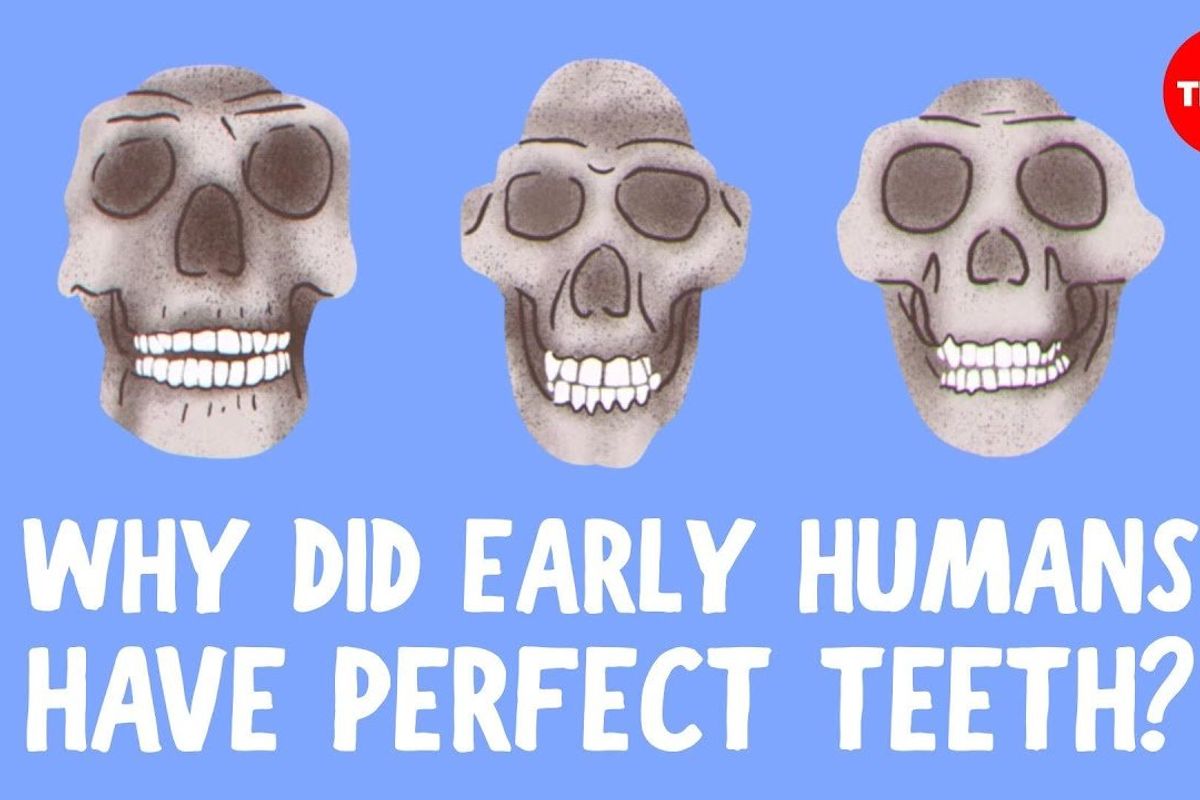Video breaks down why early humans had naturally straight teeth and we don't
Thanks, innovation!

Technology isn't everything.
Crooked teeth is a very, very common occurrence in our modern world. Nine out of ten people have at least some misalignment going on in their mouths. Over 4 million people wear braces in the United States alone. I don’t know about you, but I can still feel the utter sticker shock from my own teeth-straightening journey. (I call it a “journey” so it feels a little more whimsical and less devastating.)
And yet, this is not something our ancestors dealt with. Like…at all. How could it be that no one experienced this normal modern-day conundrum in a time when we had exponentially less technological advancement?
As it turns out, technology might be the culprit, and a video from Ted-Ed explains it all.The prevailing theory in the scientific community is that millions of years ago, when humans were hunter-gatherers, their teeth had to work extra hard to grind down seeds, fruit, meat, etc., and make them digestible.
When humans began incorporating tools, food was broken down before it even entered the mouth. It only became more refined and easier to chew with the introduction of agriculture, followed by the innovations of the Industrial Revolution.In a relatively short amount of time (12,000 years), teeth were basically relieved of most of their “pulverizing duties.” And while teeth were initially able to adapt to the gradual evolution of culinary changes, things simply changed too quickly to keep up. Over time, jaws have reduced in size much more quickly than our teeth have, leading to overcrowding and some…unique dental arrangements.
This also helps explain why wisdom teeth are such a pain. By the time these final molars come out, there is simply no room left in the mouth for them. This is why many people need them surgically removed in order to prevent discomfort or infection.
This theory has been tested on animals like spider monkeys and lyraxes, who were given naturally tough foods and artificially softened foods. Sure enough, the critters with the softer foods also developed narrower jaws, and more crooked teeth.
Bottom line: this issue has a lot more to do with lifestyle than anything genetic. Which is why different people in different parts of the world don’t deal with dental crowding at all, and even have room for wisdom teeth. Knowing this might not stop us from eating softer foods—it’s certainly not gonna make me give up warm gooey cookies any time soon, perfect smile and zero cavities be damned—but it’s certainly something to chew on.
You can watch the full video, based on a lesson by dental anthropologist G. Richard Scott, below:- 9-year-old finds rare, prehistoric megalodon tooth the size of her hand in Maryland waters ›
- Ever wondered how a hippo gets its teeth cleaned? It's even cuter than you might think. ›
- How farming gave humans overbites and the ability to pronounce 'f' and 'v' ›
- Dental student blows people's minds about how and why to floss - Upworthy ›
- People are nostalgic for the charm and character of real teeth - Upworthy ›
- 'Forgotten' system for harvesting water transforms 'barren wasteland' into lush farmland - Upworthy ›



 A Generation Jones teenager poses in her room.Image via Wikmedia Commons
A Generation Jones teenager poses in her room.Image via Wikmedia Commons
 A Target store at night.via
A Target store at night.via  An aisle at a Target.via
An aisle at a Target.via 

 Which map app is best?
Which map app is best? We've become pretty finicky about our map apps in the modern age.
We've become pretty finicky about our map apps in the modern age.